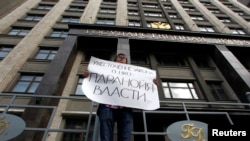Russian authorities on Monday blacklisted the Open Society Foundations run by U.S. financier George Soros.
Russia's prosecutor general's office added the Open Society Foundations and the Open Society Institute Assistance Foundation to a list of “undesirable” organizations, which bans them from continuing to give grants to Russian partners.
Under a vague law passed in May and signed by President Vladimir Putin, prosecutors said the Soros foundations were undermining Russia's constitutional foundations, defense and national security.
The law gives prosecutors the power to shut down any foreign and international organizations in Russia deemed a threat, and to fine and imprison any Russian repeat offenders working with them for up to six years.
The Open Society Foundations defended its record in Russia, issuing a statement late Monday saying that “for more than a quarter century, it helped to strengthen the rule of law in Russia and protect the rights of all.” It expressed dismay at the prosecutor's decision and went on to say, “In the past, our efforts have been welcomed by Russian officials and citizens, and we regret the changes that have led the government to reject our support to Russian civil society and ignore the aspirations of the Russian people.”
In Washington, the U.S. State Department issued a statement saying, "We are deeply troubled by Russia’s continued restrictions against civil society organizations... [The] designation of the Open Society Foundations and the Open Society Institute Assistance Foundation as so-called “undesirable” organizations will only further restrict the work of civil society in Russia for the benefit of the Russian people. This action is yet another example of the Russian government’s growing crackdown on independent voices and a deliberate step to further isolate the Russian people from the world."
The Open Society Foundations said that since 1987 it has helped numerous Russian groups and individuals in the fields of education, science and public health, as well as financing networks of Internet centers in 33 universities and a network of contemporary art centers.
It is the second group shut down in Russia by authorities under the “undesirable organizations” law - both of them from the United States. The National Endowment for Democracy in late July was the first to be banned from conducting activities in Russia. The NED promotes democratic development, but Russian prosecutors accused it of using Russian groups to discredit elections and army service, as well as try to influence government policy.
Russian officials and state media have portrayed the NED and Soros' foundations as creating instability and revolutions, including in Ukraine, because of support for democracy activists and groups.
Rights groups say the blacklisting of “undesirable organizations” is part of a broader crackdown on independent groups since Putin returned to the Kremlin in 2012 amid a wave of anti-government protests.
Tanya Lokshina, Russia program director at Human Rights Watch in Moscow, says prosecutors are using the undesirables law to stifle dissent and squeeze the life out of Russian civil society. “They are, for now, going after American donors. But, those American donor institutions have been very supportive to Russian civil society groups.”
Russia in 2012 passed a law against “foreign agents,” Russian organizations that accept foreign funding and engage in activities deemed political, which implies spying or disloyalty.
Lokshina says more than 100 independent groups, including human rights and scientific organizations, are demonized under the law in the public eye. “It looks like the authorities are dividing non-governmental organizations into loyal and not loyal. And, those that they believe to be not loyal, in other words critical, are treated as enemies of the state and presented as enemies of Russian society.”
A number of organizations chose to shut down operations because of the "foreign agent" label or were forced to under pressure.
Despite being labeled “undesirable” and losing the legal authority to work in Russia, Open Society Foundations founder George Soros said he is confident the move is temporary. He said “the aspirations of the Russian people for a better future cannot be suppressed and will ultimately succeed.”
The Open Society Foundations said it would continue to support those who seek assistance in accordance with its mission and within the limits of the law.




